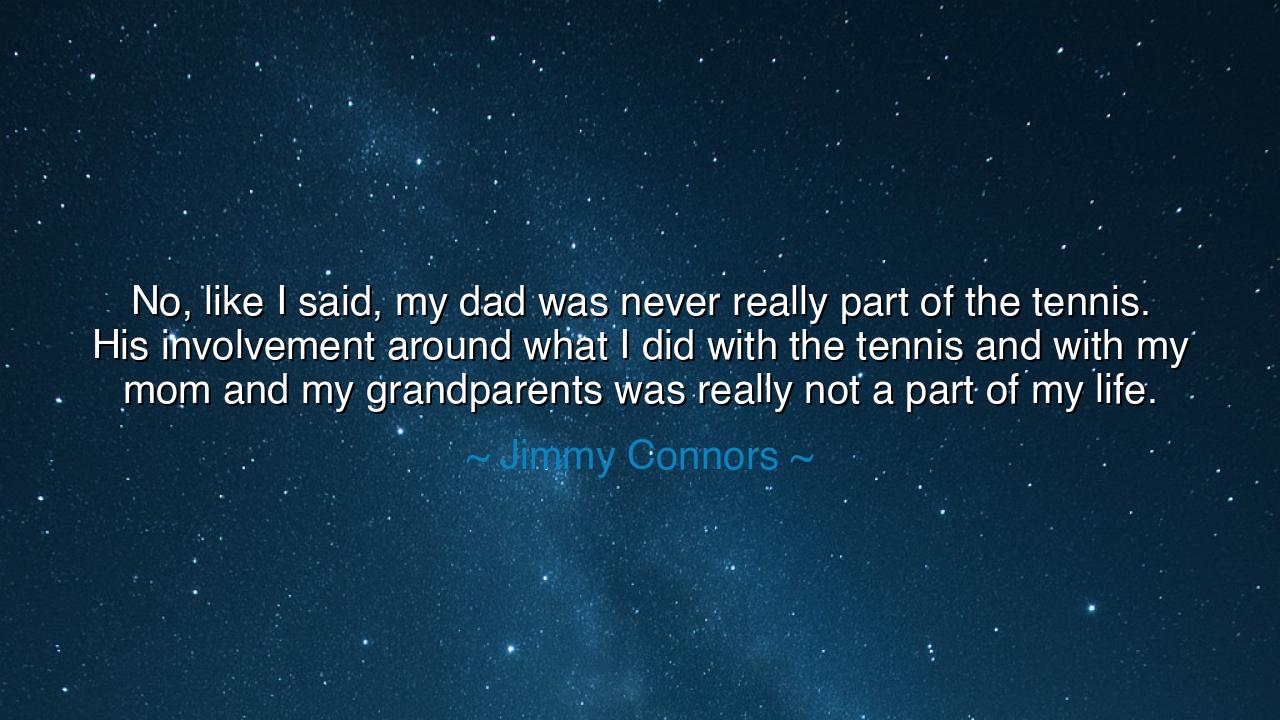
No, like I said, my dad was never really part of the tennis. His
No, like I said, my dad was never really part of the tennis. His involvement around what I did with the tennis and with my mom and my grandparents was really not a part of my life.






Hearken, children of reflection, to the words of Jimmy Connors, who recalls: "No, like I said, my dad was never really part of the tennis. His involvement around what I did with the tennis and with my mom and my grandparents was really not a part of my life." In these words lies a meditation on absence, parental influence, and the shaping of character in the shadow of disengagement. Since the days of the ancients, philosophers and poets have understood that the presence—or absence—of those who guide us profoundly affects the arc of a life, forging resilience, independence, and self-reliance.
The ancients recognized that the family is both the cradle and the forge of human virtue. Cicero spoke of the household as the first school of courage, discipline, and moral strength. Connors’ reflection that his dad was distant in matters of tennis, despite the centrality of the sport to his life, illuminates a timeless truth: guidance and mentorship are not always present, and in their absence, the individual must discover inner resources to thrive. The void left by an absent parent, though painful, can also awaken ingenuity, determination, and self-mastery.
Consider the life of Alexander the Great, whose father, Philip II, though a powerful ruler, was often preoccupied with conquest and political strategy, leaving young Alexander to cultivate much of his own discipline and strategic insight. In the absence of constant parental oversight, Alexander developed the independence and daring that would mark his achievements. Likewise, Connors’ experience reveals that the absence of paternal involvement did not halt his progress; rather, it may have demanded that he cultivate self-direction and inner resolve.
Yet the quote also carries a note of grief and recognition. The mention of his mom and grandparents highlights the familial support that did exist, suggesting that while one pillar—his father—was missing, other relationships provided stability and guidance. The ancients often spoke of the importance of extended kin and community in the formation of character, recognizing that the care of a parent is not the sole source of nurture. Connors’ story underscores that the human spirit can draw strength from multiple sources, even when one central figure is absent.
This reflection teaches the enduring lesson of resilience in the face of partial absence. Life rarely unfolds with perfect support or guidance, and the measure of character is often found in how one navigates such gaps. Connors’ success in tennis, despite his father’s disengagement, is a testament to perseverance, discipline, and the cultivation of self-reliance—qualities revered by philosophers, generals, and statesmen of old.
Practical actions emerge naturally from this understanding. Recognize and honor the sources of guidance and support that are present in your life, whether family, mentors, or community. When faced with absence or indifference, cultivate your own discipline, focus, and initiative, knowing that self-reliance is forged in the crucible of challenge. Do not lament what is missing; instead, channel energy toward what can be nurtured and developed.
Reflect also upon the broader implications of parental involvement. For those who guide or teach, the lesson is clear: engagement matters profoundly, shaping the confidence, skill, and emotional resilience of those who depend upon you. Even small gestures of attention and encouragement can ripple outward into lives of achievement and moral strength.
Remember, children of the ages, that the presence or absence of guidance shapes destiny, but does not wholly define it. Jimmy Connors’ words illuminate the enduring truth that success, character, and resilience often arise from navigating gaps, cultivating independence, and drawing on the support that remains. In embracing this challenge, one transforms absence into opportunity, adversity into strength, and partial guidance into a foundation for enduring achievement.






AAdministratorAdministrator
Welcome, honored guests. Please leave a comment, we will respond soon